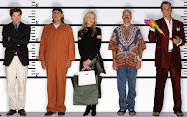Blaise Aguera y Arcas takes you through a mind-blowing photosynthesis demo. Can you imagine having Dickens's entire Bleak House as a single text? What about overlapping images from Google that recreate Notre Dame as a 3D model? This is virtual reality; you can see Paris without ever having been there. He is challenging "the limits of screen real estate" and takes you on a microscopic pixelated journey through the future of computer imagery. You can check out the Photosynth demo here. (March 2007, 7:42)
From Ted.com:
Stephen Petranek was the editor-in-chief of Discover magazine when he became fascinated by the dangers that face the human race. He has become an eloquent advocate for making policy decisions based on an unflinching look at our worst fears. Although his apocalyptic predictions may seem dire and inevitable, he argues precisely the opposite, and presents plausible goals that will defuse most of these catastrophes. Just in case that isn't enough, he makes the case for humankind adopting a forward-looking policy of space exploration and colonization to get us out of here alive. For the first time in history, he argues, humans can control many of the threats to survival both on and off the planet.Stephen Petranek looks at ten ways the world could end: depression, aliens (oh, I wish), eco-collapse, particle accelerator mishap (creating little black holes and then expecting them to evaporate, what?), biotech mishap, pole reversal, solar flare, epidemic, rogue black hole (10 million dead stars in the Milky Way?!?), and asteroids. (My vote hopes for a black hole. Wouldn't that be interesting?) If you don't want to watch all 29 minutes, you can skip to labeled sections of the talk. But I do recommend watching the whole thing because his candid look at our world's inevitable demise is often humorous. (February 2002, 29:54)
A.J. Jacobs combines journalism and performance art. He takes on humanist experiments, like being entirely honest for a month or reading the entire encyclopedia (which he catalogued in his book The Know-It All, offering snippets and insights into the words he learned). His latest experiment is living biblically, which involves living by 700+ laws of the Bible, from the mundane and obvious ("I can go a year without killing someone") to the quotidian vices (like gossiping or lying). He even took the law "be fruitful and multiple" law seriously by impregnating his wife, who later gave birth to twins. He came to one conclusion, among others, that suggests that if one changes their behavior, they can change their cognitive functions. If you act like a better person, you will become a better person. (It's the Hamlet dilemma -- is man defined by his thoughts or his actions? More and more evidence seems to point towards actions...) And he's starting a movement of Reverent Agnosticism. How interesting. You can read about some of the rules here. (December 2005, 17:40)









.jpg)


No comments:
Post a Comment